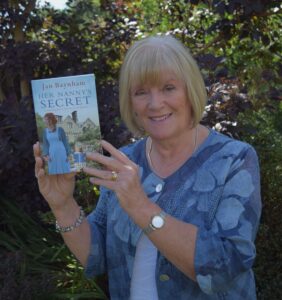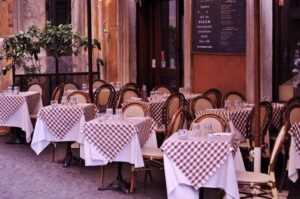 My third book, ‘Her Nanny’s Secret’, is a dual timeline novel, set in wartime and the sixties in rural mid-Wales and Normandy. It involves secrets, forbidden love, loss, and hope. In the 1963 story, my main character, Annie, travels to France with Clara Pryce to whom she was nanny when she was younger. Clara’s father had been shot down over Normandy in June 1943. Now as an adult, Clara is keen to try to find out what happened to him and where he’s buried. My chosen scene in the novel is when Annie accompanies Clara to Ville de Roi, a town near where her father’s Spitfire fighter plane had been shot down. It’s her first day and I want to capture Annie’s reactions to French life, seeing it through the eyes of someone who had never been to France before.
My third book, ‘Her Nanny’s Secret’, is a dual timeline novel, set in wartime and the sixties in rural mid-Wales and Normandy. It involves secrets, forbidden love, loss, and hope. In the 1963 story, my main character, Annie, travels to France with Clara Pryce to whom she was nanny when she was younger. Clara’s father had been shot down over Normandy in June 1943. Now as an adult, Clara is keen to try to find out what happened to him and where he’s buried. My chosen scene in the novel is when Annie accompanies Clara to Ville de Roi, a town near where her father’s Spitfire fighter plane had been shot down. It’s her first day and I want to capture Annie’s reactions to French life, seeing it through the eyes of someone who had never been to France before.
As she and Clara approach the town, ‘the sea sparkled like a mirror in the afternoon sun’ to the left; ‘coves and inlets surprised her around each bend’ in the road. Once parked, they wander through the streets, eventually choosing a pretty crepêrie where they can have lunch.
La Belle Epoque was situated down a narrow, cobbled street branching off from the main square. Outside, tables, covered with red-and-white tablecloths, and bentwood chairs were placed along each of the two large windows. Ornamental fruit trees in brightly glazed pots separated each table.
‘Is it warm enough to sit outside, do you think?’ asked Clara.
Just being able to sit out in the fresh air to eat is a new experience for Annie. A real treat. None of the cafés in Pen-y-Rhos have outdoor seating.
 They sat down and studied the menu. Annie had never seen such a choice and couldn’t decide from the images between a savoury galette filled with ham and cheese, topped with a fried egg, or, to satisfy her sweet tooth, a crêpe, oozing with cooked local apples and whipped cream.
They sat down and studied the menu. Annie had never seen such a choice and couldn’t decide from the images between a savoury galette filled with ham and cheese, topped with a fried egg, or, to satisfy her sweet tooth, a crêpe, oozing with cooked local apples and whipped cream.
Clara laughed at her indecision and Annie wondered if her eyes were as wide as she felt them to be.
Back home, pancakes are only eaten on Shrove Tuesday and then always with lemon juice and white sugar.
Later in the scene, they come to a central square where a group of elderly men are playing a game Annie hadn’t seen before.
‘Pétanque,’ said Clara. ‘It’s very popular in this part of France.’
They found a bench and watched the game in progress. One man threw a small white ball onto the dusty gravel, a ‘jack’ Clara called it. In turn, each player threw a larger silver coloured ball, a boule, as close to the jack as they could. The men became more animated as the game went on especially when someone’s boule knocked another’s further away from the jack.
 ‘Every village will have a square for pétanque. Can you see how earnestly the old men take the game? You must never disturb a player when they’re about to throw.’ Clara laughed, waving a finger.
‘Every village will have a square for pétanque. Can you see how earnestly the old men take the game? You must never disturb a player when they’re about to throw.’ Clara laughed, waving a finger.
Clara explains to her that even the smallest village in France would have a square and a town hall, a mairie. Annie can’t get over how many cafés and bars there were in one place.
Pretty window boxes adorned the upstairs windows and scarlet summer geraniums and tumbling blue lobelia gave a blaze of colour.
During the rest of her time in France, Annie is to encounter many more new experiences. In the search for Clara’s father, she could never have imagined the outcome of the visit. Keeping her secret for over twenty years is justified at last.
https://janbaynham.blogspot.com
